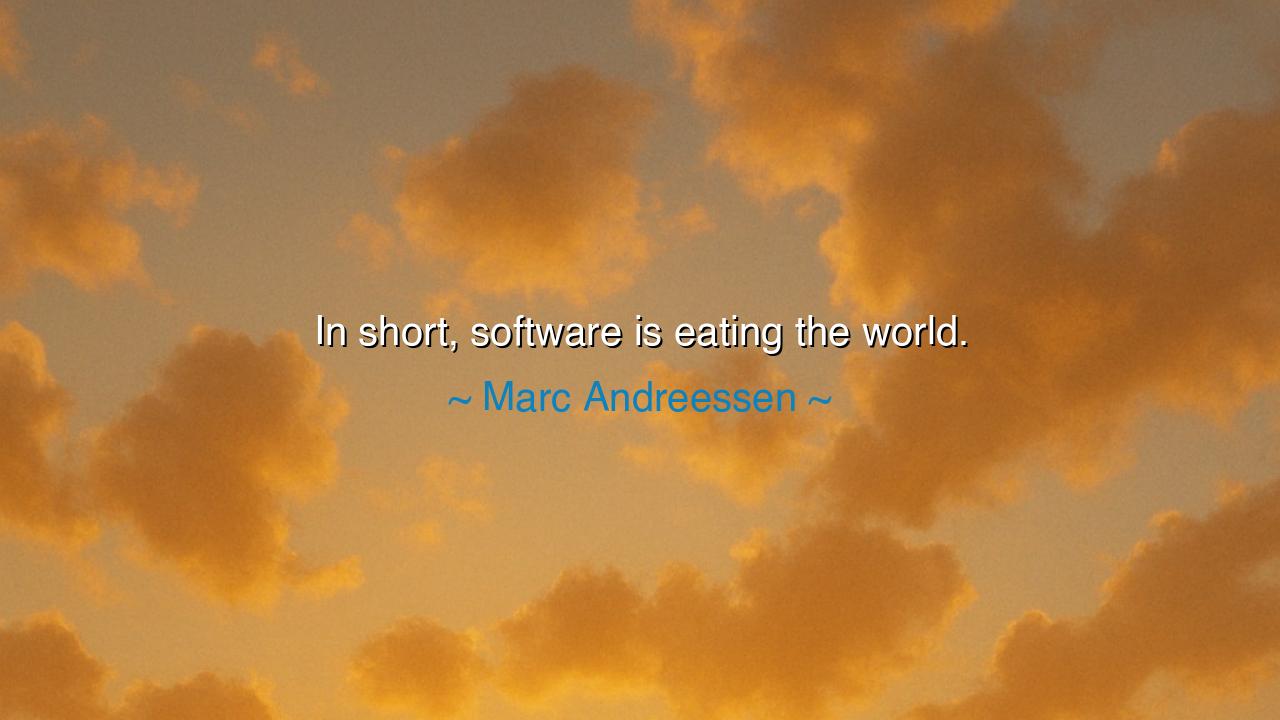
In short, software is eating the world.






Marc Andreessen’s words, “In short, software is eating the world,” carry a deeply prophetic insight about the modern world we inhabit. The statement reflects the reality of our times: software has not merely become a tool for tasks, but has evolved to shape the very fabric of our society, economy, and even personal lives. Andreessen speaks to the all-encompassing nature of software, and how it has crept into every corner of existence, transforming industries, redefining relationships, and creating new possibilities for the human experience. To say that software is “eating” the world is to acknowledge its power to reshape and reorganize the very foundations of life as we know it.
In the ancient world, tools were revered for their ability to enhance the human experience, but there was a deep awareness of their limitations. Homer’s Iliad speaks of warriors wielding swords and shields—tools of power in battle, but tools that were never meant to overshadow the very essence of human action and courage. Alexander the Great, too, understood that victory was not merely the result of superior weaponry but was a combination of strategy, leadership, and valor. Yet, what Andreessen describes is something different: an evolution of tools that does not merely support life, but redefines it. Like the rise of the sword in ancient times, software is becoming the dominant force, one that is gradually becoming inseparable from the progress of humanity.
The concept of software eating the world is not just an observation of change, but a reminder of how the world and humanity have been continuously reshaped by transformative forces. One need look no further than the example of the printing press, which, upon its invention, drastically altered the flow of knowledge and information. Before Gutenberg’s press, books were rare and expensive, owned only by the elite. But once the printing press made books more accessible, it revolutionized society, giving birth to the Renaissance and the Reformation, and eventually changing the way we think about education and knowledge. Similarly, software is not simply transforming individual sectors of the economy, it is reshaping how society itself functions, from commerce to communication to entertainment. Just as the printing press opened the floodgates of knowledge, software has opened the floodgates of innovation.
Consider the rise of companies like Uber and Airbnb, which, at their core, are not based on physical assets but on software platforms that connect people in ways that were once unimaginable. Uber didn’t create new vehicles, and Airbnb didn’t build new hotels. Instead, they redefined industries by leveraging software to create decentralized networks that connect individuals to services. This is a perfect example of what Andreessen means when he says that software is eating the world. It is not merely assisting or supporting businesses; it is transforming the very infrastructure of how businesses operate, how people interact, and how economies grow. The world itself is becoming increasingly dependent on software, whether we acknowledge it or not.
One might also look at the social media revolution—Facebook, Twitter, and Instagram are not just platforms for connection, but digital ecosystems where personal and commercial interactions are shaped. These platforms, driven by software, have influenced politics, sparked revolutions, and even redefined what it means to be connected. In the ancient world, the Agora in Athens was the heart of civic life, where ideas were exchanged, and decisions were made. Today, much of this happens through software platforms, which have become the new Agora. The power of these platforms lies in their ability to connect people, influence ideas, and change the course of history—showing once again how software has become an integral force in shaping the world.
Yet, this dominance of software is not without its risks. The ancients were not blind to the dangers of becoming too reliant on any one force, whether it was military power, political systems, or technological tools. Socrates, for example, cautioned that true wisdom did not lie in the accumulation of knowledge, but in the ability to discern its proper use. Similarly, the Roman Empire collapsed in part because of its inability to adapt to the changing conditions of the world around it. If software is indeed eating the world, we must be vigilant to ensure that it does not also consume the essence of our humanity—our ability to think critically, to connect meaningfully, and to act with wisdom.
Lesson for the ages:
As the ancients knew, the tools we create, while powerful, must always serve the greater purpose of human flourishing. The rise of software is a testament to human ingenuity, but we must remember that it is not the tool that defines us, but how we use it. The world may be changing, and software may be at the forefront of that change, but our human spirit—our wisdom, compassion, and integrity—must remain at the heart of our endeavors. Just as Socrates warned that knowledge alone is not enough, we must understand that progress is only meaningful when it enhances the human experience, not diminishes it.
Practical Action:
In your life, embrace software and technology as tools to enhance your experience, but do not allow them to define your existence. Use these tools to connect, to create, and to explore, but always with the awareness that technology is a servant, not a master. Seek balance—while software can revolutionize your world, do not let it rob you of your humanity. As the ancients did with their tools, we too must wield software wisely, always ensuring that our values, purpose, and wisdom guide its use, rather than the other way around.






AAdministratorAdministrator
Welcome, honored guests. Please leave a comment, we will respond soon